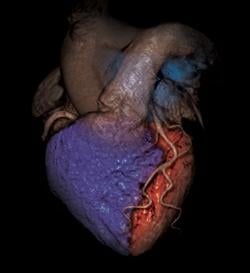
December 6, 2011 – Findings on coronary CT angiography (CTA), a noninvasive test to assess the coronary arteries for blockages, show different risk scenarios for men and women, according to a study presented today at the Radiological Society of North America (RSNA).
Coronary artery disease (CAD) is a narrowing of the blood vessels that supply blood and oxygen to the heart. It is caused by a build-up of fat and other substances that form plaque on vessel walls. According to the Centers for Disease Control and Prevention, heart disease is the leading cause of death for both men and women in the United States.
Researchers at the Medical University of South Carolina analyzed the results of coronary CTA on 480 patients, mean age 55, with acute chest pain. Approximately 65 percent of the patients were women, and 35 percent were men. The possibility of acute coronary syndrome was ruled out for each of the patients.
Using coronary CTA, the researchers were able to determine the number of vessel segments with plaque, the severity of the blockage and the composition of the plaque.
"The latest CT scanners are able to produce images that allow us to determine whether the plaque is calcified, non-calcified or mixed," said John W. Nance Jr., M.D., currently a radiology resident at Johns Hopkins Hospital in Baltimore, Md.
By comparing the coronary CTA results with outcome data over a 12.8-month follow-up period, the researchers were able to correlate the extent, severity and type of plaque build-up with the occurrence of major adverse cardiac events, such as a heart attack or coronary bypass surgery. The statistical analysis tested all plaques combined (calcified, non-calcified and mixed) and each individual plaque type separately.
"We found that the risks for cardiovascular events associated with plaque were significantly different between women and men," Nance said.
Within the follow-up period, 70 of the patients experienced major adverse cardiac events, such as death, heart attack, unstable angina or revascularization. In total, 87 major adverse cardiac events occurred among the patients during the follow-up period.
When the outcome data were correlated with the CTA combined plaque findings, the results indicated that women with a large amount of plaque build-up and extensive atherosclerosis are at significantly greater cardiovascular risk than men.
Specifically, the risk for major adverse cardiac events was significantly higher in women than in men when extensive plaque of any kind was present or when more than four artery segments were narrowed.
"This research tells us that extensive coronary plaque is more worrisome in women than the equivalent amount in men," Nance said.
However, when analyzing risk factors associated with the presence of individual types of plaque, the risk for major adverse cardiac events was greater in men, compared to women, when their artery segments contained non-calcified plaque.
Nance said the new data suggested that the atherosclerotic process, or hardening of the arteries, is not necessarily linear and that more research is needed to better understand the disease.
"Our research confirms that coronary CTA provides excellent prognostic information that helps identify risk, but there are gender differences that need to be considered," Nance said.
Coauthors are U. Joseph Schoepf, M.D., Christopher Schlett, M.D., Garrett Rowe, B.S., J. Michael Barraza, B.S., and Fabian Bamberg, M.D., M.P.H.
For more information: RadiologyInfo.org


 January 05, 2026
January 05, 2026 









